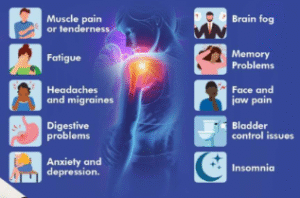Unveiling the Silent Storm: How Does Fibromyalgia Affect the Body in Ways You Never Imagined
How Does Fibromyalgia Affect the Body?
Fibromyalgia is not just about chronic pain. It is a complex and multi-system disorder that impacts nearly every part of the body. For those living with it, the condition can feel like a silent storm raging beneath the surface—unseen, unpredictable, and often misunderstood. It affects physical health, cognitive function, emotional well-being, and even the body’s response to external stimuli.
While the pain is central to the condition, fibromyalgia’s reach extends beyond muscles and joints. It influences the nervous system, sleep patterns, digestion, and energy levels, resulting in a cascade of symptoms that differ from person to person but follow a consistent pattern of disruption across several bodily systems.
The Nervous System Under Siege
The central nervous system plays a key role in fibromyalgia. Research shows that people with this condition often have an amplified perception of pain. This means that their brains overreact to pain signals or even misinterpret harmless sensations as painful.
This heightened sensitivity is known as central sensitization. It involves an overactive response in the brain and spinal cord to normal sensory input. Even soft touches, mild pressure, or changes in temperature can cause significant discomfort.
Moreover, the sympathetic nervous system, which controls the fight-or-flight response, tends to remain activated in fibromyalgia patients. This can lead to persistent states of stress and muscle tension, intensifying pain and fatigue.
Widespread Musculoskeletal Pain and Fatigue
At the core of fibromyalgia is persistent, widespread musculoskeletal pain. Unlike the localized aches that most people experience from time to time, fibromyalgia pain is often described as a deep, burning, or throbbing sensation that moves throughout the body.
Pain may center around specific tender points, such as the neck, shoulders, back, hips, elbows, and knees. These areas can feel sore to the touch and may worsen with physical activity or stress.
Chronic fatigue accompanies the pain and can be just as debilitating. Despite adequate rest, individuals often wake up feeling unrefreshed, and even simple tasks can feel exhausting. This fatigue is not simply physical but also mental, affecting the ability to think, focus, and process information clearly.
The Impact on Cognitive Function: Understanding Fibro Fog
One of the most puzzling symptoms of fibromyalgia is cognitive dysfunction, often referred to as “fibro fog.” This includes difficulties with:
- Concentration
- Memory retention
- Word-finding
- Multitasking
- Mental clarity
This fog can make it hard to maintain employment, engage in conversations, or handle daily responsibilities. While it is not a degenerative brain condition, the cognitive symptoms can severely impair one’s ability to function, contributing to frustration and social withdrawal.
Sleep Disturbances and Their Consequences
Fibromyalgia often disrupts the body’s natural sleep cycle. Individuals may struggle to fall asleep or wake frequently during the night. Even after long periods of rest, sleep tends to be non-restorative.
Two key sleep disorders frequently co-occur with fibromyalgia: restless leg syndrome and sleep apnea. The lack of deep, restorative sleep exacerbates symptoms like fatigue, mood swings, and pain sensitivity.
Because the body performs many healing functions during deep sleep, this chronic disruption can affect hormone levels, immune response, and the ability to manage stress.
Digestive System Disruption and IBS
Fibromyalgia’s influence extends to the gastrointestinal system. Many people with fibromyalgia also experience irritable bowel syndrome (IBS), a condition characterized by bloating, abdominal cramps, diarrhea, constipation, and food sensitivities.
This overlap may be due to the gut-brain axis, a communication network that links emotional and cognitive centers of the brain with intestinal functions. In fibromyalgia, this axis may become dysregulated, contributing to digestive problems.
Additionally, altered gut microbiota and stress-related gastrointestinal changes further aggravate these symptoms, making dietary management a crucial component of treatment.
Emotional and Psychological Toll
Fibromyalgia does not merely affect the body—it also takes a significant toll on emotional and mental well-being. Chronic pain, cognitive dysfunction, and fatigue can lead to:
- Depression
- Anxiety
- Mood instability
- Social isolation
- Reduced self-esteem
The condition often creates a cycle where physical symptoms trigger emotional distress, which in turn amplifies physical pain. It’s not uncommon for those with fibromyalgia to feel misunderstood or disbelieved, especially when outward appearances suggest they are healthy.
Mental health care, including counseling and support groups, plays an essential role in managing the emotional effects of the condition.
Skin Sensitivity and Sensory Overload
The skin becomes another unexpected target of fibromyalgia’s effects. Many individuals experience heightened sensitivity to touch, often described as a burning or tingling sensation across the skin.
This condition, known as allodynia, means that even light contact from clothing or a gentle breeze can feel uncomfortable or painful. There may also be episodes of unexplained itching, swelling, or numbness.
Sensory overload is another major concern. Bright lights, loud noises, or strong odors can quickly overwhelm the senses, leading to anxiety, fatigue, and headaches. This hypersensitivity makes navigating busy environments or crowded public spaces especially challenging.
Cardiovascular and Circulatory Effects
Some individuals with fibromyalgia report symptoms related to blood pressure regulation and circulation. These may include:
- Dizziness or lightheadedness upon standing (orthostatic intolerance)
- Cold hands and feet due to poor circulation
- Irregular heartbeat or palpitations
While fibromyalgia is not a cardiovascular disease, these symptoms can mimic heart-related conditions, leading to frequent medical evaluations and tests.
The underlying cause may involve dysautonomia, a malfunction of the autonomic nervous system that controls involuntary bodily functions, including heart rate and blood pressure.
Hormonal and Endocrine Disruptions
The endocrine system, which regulates hormones, may also be affected. People with fibromyalgia often show irregularities in the levels of cortisol, serotonin, dopamine, and growth hormone.
These hormonal shifts can influence:
- Energy levels
- Mood stability
- Sleep cycles
- Metabolism
- Pain sensitivity
Although hormone replacement therapy is not commonly used for fibromyalgia, understanding these imbalances helps explain many of the unexplained symptoms patients experience.
FAQs About How Fibromyalgia Affects the Body
1. Can fibromyalgia cause permanent damage to muscles or joints?
No, fibromyalgia does not cause tissue damage or inflammation like arthritis, but the pain and stiffness can feel just as intense.
2. Why does fibromyalgia make me so tired?
The chronic fatigue results from non-restorative sleep, hormonal imbalances, and constant nervous system activation.
3. Are the digestive symptoms caused by fibromyalgia itself?
Yes, many people experience IBS and other digestive issues due to the gut-brain axis disruptions and stress responses.
4. Is there a connection between fibromyalgia and mental health?
Absolutely. Depression, anxiety, and mood disorders are common and often need to be managed alongside physical symptoms.
5. Can fibromyalgia affect your vision or hearing?
While not directly, sensory hypersensitivity can make bright lights and loud noises feel overwhelming, causing discomfort.
6. Does fibromyalgia shorten life expectancy?
No, fibromyalgia does not affect lifespan, but it does affect quality of life. Proper treatment and lifestyle changes can significantly improve daily living.
Conclusion
Understanding how fibromyalgia affects the body is key to managing the condition and improving quality of life. Its impact is widespread, touching nearly every system—neurological, musculoskeletal, digestive, emotional, and hormonal. Despite being invisible to the naked eye, the effects are deeply felt by those who live with it daily.
A holistic approach that combines medical treatment, lifestyle adjustments, and emotional support offers the best path forward. By addressing the full spectrum of symptoms, individuals can regain a sense of control, reduce flare–ups, and live more comfortably with fibromyalgia.



